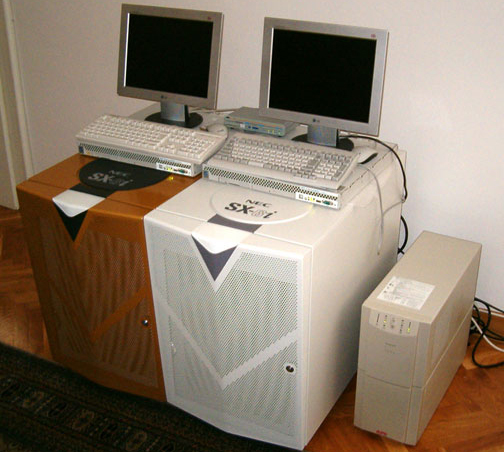
Supercomputer of the latest generation
Belgrade, 31 August 2004
Minister of Labour, Employment and Social Affairs, in the Government of Serbia, Slobodan Lalović and Japanese Ambassador in Serbia and Montenegro, Rjuici Tanabe, have opened today Center for Simulation Sciences “Japan – SCG” in Belgrade. On that occasion, the Centre has received the Japanese donation – the two supercomputers SX 6 of the latest generation, which have appeared in Southeast Europe for the first time.
In addition to several university and scientific centres in Europe, these supercomputers are in possession of large companies such as “Boing”, “Mercedes” and hydro meteorological services of some counties. The possession of such supercomputer opens the possibility of inclusion of our scientific institutions in the realization of global projects such as, for example, changing climatic conditions in the region.

The Minister Lalović said that this event has a great importance for our country, because it enables the return of Serbia into the modern technological society, from which it was isolated for a long time. According to him, Serbian-Japanese cooperation will give a great contribution to the development of science in the country and stop “brain drain”, as the young scientists will have the opportunity, by using computers SX 6, to deal with the problems of modern science and technology.
Ambassador Tanabe said that the Centre for Simulation Sciences is the result of the scientific exchange and cooperation between two countries and hoping for the cooperation in the field of scientific research to be one of the bridges that will connect SCG and Japan.
Tanabe said that the process of economic recovery and democratization in a country is strenuous and difficult, and he added that the Japanese government has repeatedly sent aid to Serbia in order to successfully overcome this period. He recalled that the Government of Japan, after the democratic changes until today, has sent the aid to the people of Serbia in the amount of 70 million dollars.
The Director General of the Japanese Center for simulation Tetsuya Sato, who takes the greatest credit for the donation and formation of the Belgrade Center, said that there are exceptional resources for the promotion and development of simulation sciences in Serbia, and that Belgrade has huge potential to become a world scientific leader.








